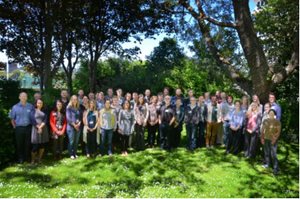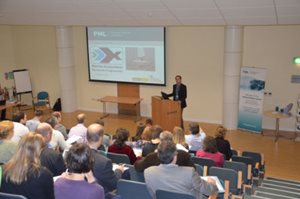MERP Programme Launches
Published: 14 May 2014
 June saw the kick-off meeting of the £5m Marine Ecosystem Research Programme (MERP), jointly funded by the Natural Environment Research Council (NERC) and the Department for Environment, Food and Rural Affairs (Defra).
June saw the kick-off meeting of the £5m Marine Ecosystem Research Programme (MERP), jointly funded by the Natural Environment Research Council (NERC) and the Department for Environment, Food and Rural Affairs (Defra).
Over 40 of the UK’s leading marine scientists gathered in Plymouth to discuss the workplan that will enable them to address key knowledge gaps relating to the UK marine environment, and promote the sustainable management of our seas. Plymouth Marine Laboratory is leading this programme and was the ideal place to host the kick-off meeting as it overlooks one of the most studied marine ecosystems in the world - Plymouth Sound.
By bringing together existing data from a wide range of sources, and collecting new data, this five-year, interdisciplinary research programme will facilitate the development of a more accurate suite of marine ecosystem models. This will provide vital evidence, tools and advice to policymakers and environmental managers on the mechanics and dynamics of marine ecosystem services provided by the marine environment, during a time of global environmental change.
 Marine ecosystem services is a term used to describe the economic and societal benefits provided by the marine environment to human health, wealth and well-being. These include benefits such as providing food, regulating our
Marine ecosystem services is a term used to describe the economic and societal benefits provided by the marine environment to human health, wealth and well-being. These include benefits such as providing food, regulating our
climate, defending our coastlines and recreation. Human activities can have significant impacts upon these benefits directly, such as through the use of marine resources, as well as indirectly through activities such as CO2 emissions and coastal development, so it is important that we understand and manage our exploitation of this vital source of services so that society continues to benefit into the future.
Key areas of investigation within this programme will include the role of ecological processes in marine food webs, the impact of large- and small-scale changes on ecosystem services and how functional diversity affects the regulation of ecosystem services.
Research outputs from this programme will be communicated to those involved with the development and implementation of the UK’s Marine and Coastal Access Act, Marine (Scotland) Act, Common Fisheries Policy, EU’s Marine Strategy Framework Directive (MSFD) and the OSPAR Joint Assessment and Monitoring Programme.
Share this news article with others...